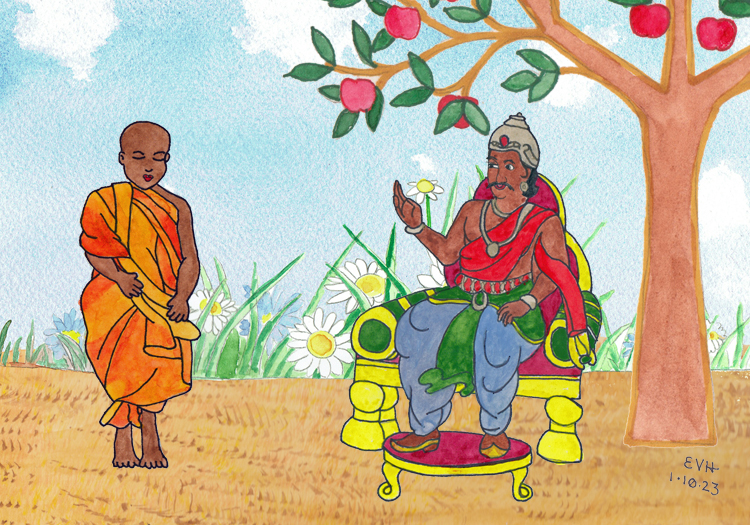
Jataka 403
Aṭṭhisena Jātaka
The Story of Aṭṭhisena
as told by Eric Van Horn
originally translated by H.T. Francis and R.A. Neil, Cambridge University
originally edited by Professor Edward Byles Cowell, Cambridge University
This is a lovely, simple story whose theme is that when one is accomplished on the path, the need for worldly goods all but disappears.
“Aṭṭhisena, many beggars.” The Master told this story when he was living at the shrine called Aggāḷava near Āḷavi. It is about the regulations for the building of kutis (a monastic’s hut). The occasion was told in the Maṇikaṇṭha Birth (Jātaka 253) above. The Master addressed the monks, saying, “Brothers, before the Buddha was born in the world, mendicants of other religions, even though offered their choice by kings, never asked for alms. They believed that begging from others was not agreeable or pleasant.” And then he told them this story from the past.
(Note: Āḷavi was a town 240 miles or 102 kilometers from Savatthi (SnA.i.220) and probably 96 miles or 154 kilometers from Benares. It lay between Savatthi and Rajagaha. The Buddha, on several occasions, stayed at Alavi at the Aggalava shrine which was near the town. In the sixteenth year after the Enlightenment, the Buddha spent the whole of the rainy season at Āḷavi and preached the doctrine to 84,000 listeners. There was evidently a large community of monks at Āḷavi, some of whom seem to have chiefly occupied themselves with building huts for themselves).
Once upon a time when Brahmadatta was reigning in Benares, the Bodhisatta was born in a brahmin household in a certain village. They called him young Aṭṭhisena. When he grew up, he learned all the arts at Takkasilā University, and afterwards—seeing the misery of sensual desires—he took up the holy life. He perfected the Five Faculties (1) faith/confidence, 2) energy, 3) mindfulness, 4) concentration/samadhi and 5) wisdom/insight) and the Attainments (jhānas).
For a long time he lived in the Himālaya Mountains. Then he decided to return to the world of people in order to get salt and vinegar. Eventually, he reached Benares, and after staying in a garden, he went begging on the next day at the King’s court.
The King was pleased with his bearing and manner, so he sent for him. The King placed him on a seat on the terrace and gave him good food. Receiving the Bodhisatta’s thanks, he was pleased He exacted a promise from the Bodhisatta to live in the royal garden. After that, the King went to wait on him two or three times each day.
One day, being pleased with his teaching of the Dharma, he gave him a choice, saying, “Tell me whatever you desire, beginning with my entire kingdom.” But the Bodhisatta did not say, “Give me this or give me that.” Others ask for whatever they desire, saying, “Give me this,” and the King would give it.
One day the King thought, “Other suitors and mendicants ask me to give them such and such. But the noble Aṭṭhisena, ever since I offered him a choice, asks for nothing. He is wise and skillful. I will ask him why this is.”
So one day after the early meal, he sat on one side. The King asked him why other men made requests for things but he made none. The King spoke the first stanza:
Aṭṭhisena, many beggars, though they’re strangers utterly,
Throng to me with their requests. Why have you no demands for me?
Hearing him the Bodhisatta spoke the second stanza:
Neither suitor, nor rejector of a suit, can pleasant be,
That’s the reason, be not angry, why I have no suit to thee.
Hearing his words the King spoke three stanzas:
He who lives by suing, and has not at proper season sued,
Makes another fall from merit, fails to gain a livelihood.
He who lives by suing, and has at the proper season sued,
Makes another man win merit, gains himself a livelihood.
Men of wisdom are not angry when they see the suitors throng,
Speak, my holy friend, the boon you ask for never can be wrong.
So the Bodhisatta, even though offered the kingdom, made no such requests. When the King’s wish had been so expressed, the Bodhisatta to show him the mendicants’ way said, “O great King, these demands are preferred by men of worldly desires and householders, not by spiritual seekers. From the time of their ordination, mendicants must have a pure life unlike that of a householder.” And so showing the mendicants’ way, he spoke the sixth stanza:
Sages never make petitions, worthy lay folk ought to know,
Silent stands the noble suitor, sages make petition so.
The King—on hearing the Bodhisatta’s words—said, “Sir, if a wise attendant of his own knowledge gives what ought to be given to his friend, so I would give to you such and such a thing,” and so he spoke the seventh stanza:
Brahmin, I offer you a thousand cows,
Red cows, and e’en the leader of the herd,
Hearing but now those generous deeds of thou,
I too in turn to generous deeds am stirred.

Figure: “I offer you a thousand cows.”
When he said this, the Bodhisatta refused, saying, “Great King, I took up the holy life free from defilements. I have no need of cows.” Thereafter the King lived by his example, giving alms and doing other good works. He became destined for heaven, and not falling away from his meditation, was reborn in the Brahma world.
After the lesson, the Master taught the Four Noble Truths. After the teaching, many were established in the fruition of the First Path (stream-entry). Then the Master identified the birth: “At that time the King was Ānanda, and I was Aṭṭhisena.”
